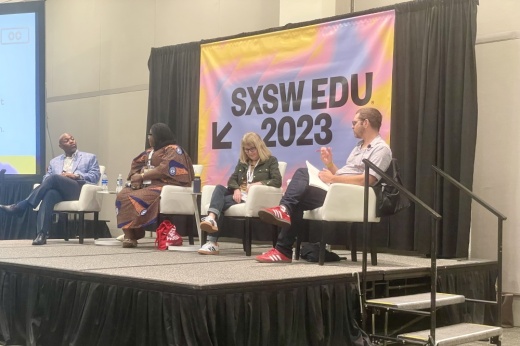What happened: In school districts throughout the country, library books with certain subject matter are being removed from shelves as a result of policies and processes allowing individuals to challenge the appropriateness of such materials.
During a SXSW EDU panel titled, “Counteracting Book Bans Through Libraries,” John Bracken, executive director of Digital Public Library of America, asked a panel of local library leaders about the push for the removal of these materials, how libraries are responding, and how educators, librarians and community leaders together can ensure libraries remain spaces for people to engage with knowledge, according to the session description.
The panel of speakers included:
- Carolyn Foote, founder of FReadom Fighters
- Tracie D. Hall, executive director of the American Library Association
- Kelvin Watson, executive director of the Las Vegas-Clark County Library District
Book banning in Texas began in 2020 when Texas Legislator Matt Krause, R-Fort Worth, sent a letter to schools throughout the state asking if libraries held any works from a list of 850 books he compiled and how the district paid for them.
The listed titles included material about student rights, abortion rights and the Supreme Court as well as books on Black, brown and LGBTQ experiences, according to Foote.
This was the impetus for her to form the FReadom Fighters, a Twitter page dedicated to protecting students’ right to read.
The subject of library access is particularly relevant now as the 88th Texas Legislature meets this year. As of March 8, there were 32 bills regarding access to libraries when the usual amount is about five, Foote said. View the list of filed House Bills and filed Senate Bills in the 88th Texas Legislature Regular Session.
According to previous Community Impact reporting, one of the 32 bills includes House Bill 338, filed by Rep. Tom Oliverson, R-Cypress, which would require publishers to issue content ratings for all books and “written material” used in public and charter schools. These ratings would limit who could access certain materials based on a student’s age and the topics discussed. There would also be an option for the state to recall books with incorrect ratings.
In addition, 801 books were banned throughout Texas from July 2021-June 2022, according to free-speech nonprofit PEN America. That is more than any other state in the nation.
Library policies on the local level
In League City, a municipality southeast of Houston, City Council approved a resolution in a 4-3 vote that prohibits the city from spending tax dollars on “obscene” material at Helen Hall Library intended for those under the age of 18.
During the meeting’s public comment section, more than 50 people voiced opposition to the resolution during public comment, citing varied concerns, including:
- the loss of valuable educational resources
- the cost of establishing a new committee
- potential legal trouble
- vague language
- the possible loss of LGBT+ representation
- censorship
- governmental overreach
- parental rights
A statement to Community Impact from the Texas Library Association, an organization that supports and improves library services across the state, said League City City Council's decision was "disheartening."
"Allowing a committee of City Council-appointed members to decide which books should be removed from the public library based on vaguely defined 'obscenity' criteria is concerning and will likely lead to content to be taken out of context, resulting in the potential removal of books that have significant value to members of our community," the statement reads. "Libraries are safe spaces for many members of our community and should be protected and valued as resources for reading materials which foster education, curiosity and creativity."
In North Texas, Keller ISD approved a policy change in August 2022 which uses guidelines based on 14 different categories to judge whether a district library book is age-appropriate and adheres to the new policies.
The banned categories include: profanity, descriptions or illustrations of nude intimate body parts, sexually explicit conduct or sexual abuse, kissing, tobacco use by minors, violence, horror, and drug or alcohol use by adults. At a meeting Nov. 14, the board of trustees voted 4-2 to add books that discuss gender identity to the previously approved ban.
In November 2022, the American Civil Liberties Union of Texas filed a complaint against the district for unlawful sex discrimination in violation of Title IX.
“Keller ISD has been on our radar for quite a long time,” ACLU of Texas Staff Attorney Kate Huddleston said. “We sent a demand letter in August for their removal of LBGTQ+ books. We put out a fact sheet...on why the new policy was unlawful, and as soon as it passed we knew we needed to act and call for a federal intervention.”
Libraries and public education
The American Library Association has a 146-year legacy, and Hall said libraries serve as public education institutions.
In a poll of the general public by the ALA, results indicated most people believe freedom of speech is a fundamental right. Hall also said there is a correlation between low literacy and over-incarceration.
Foote said the access to reading and libraries is vital to democracy, because it creates an informed citizenry. In addition, although other surveys show 80%-90% of Americans oppose banning books, 15 state legislators across the country have passed policies restricting access to books, she said.
Watson said access to libraries is not a political issue, and it is important to have objectivity so no one’s freedoms are trampled on.
How to be a part of the conversation
For those looking for a way to get involved in the issue of access to libraries, Foote said one of the best ways to have a voice is to show up to school board meetings where policies and legislation are being discussed.
For those who cannot show up to meetings, individuals can also write a letter to their school districts voicing support for free reading and information rights, she said.
Find more information about the American Library Association, FReadom Fighters and the Las Vegas-Clark County Library District. Read more about the SXSW EDU panel here.






